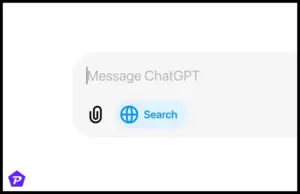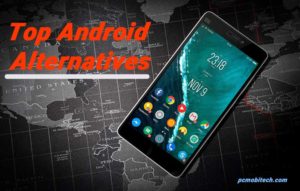Artificial intelligence has completely transformed the way we work, communicate, and solve problems. OpenAI’s ChatGPT has been a leader in this space, offering advanced conversational AI that’s made its mark in everything from customer service to creative writing. But as powerful as ChatGPT is, it’s not perfect. Whether it’s occasional server downtime, limited features in the free version, or simply the need for something tailored to specific tasks, users often look for alternatives.
The good news? The AI market is booming with options. Whether you’re a developer looking for coding help, a business leader aiming to automate tasks, or a student seeking better research tools, there’s an alternative that fits your needs. Let’s explore 10 of the best ChatGPT alternatives in 2025 and why they might just outshine ChatGPT in certain areas.
10 Best ChatGPT alternatives in 2025
There are numerous chatbot alternatives to ChatGPT that are available on the market. While ChatGPT is a popular and highly effective tool, it is important to explore other options that may better suit individual needs. Here are 10 of the best ChatGPT alternatives for 2025:
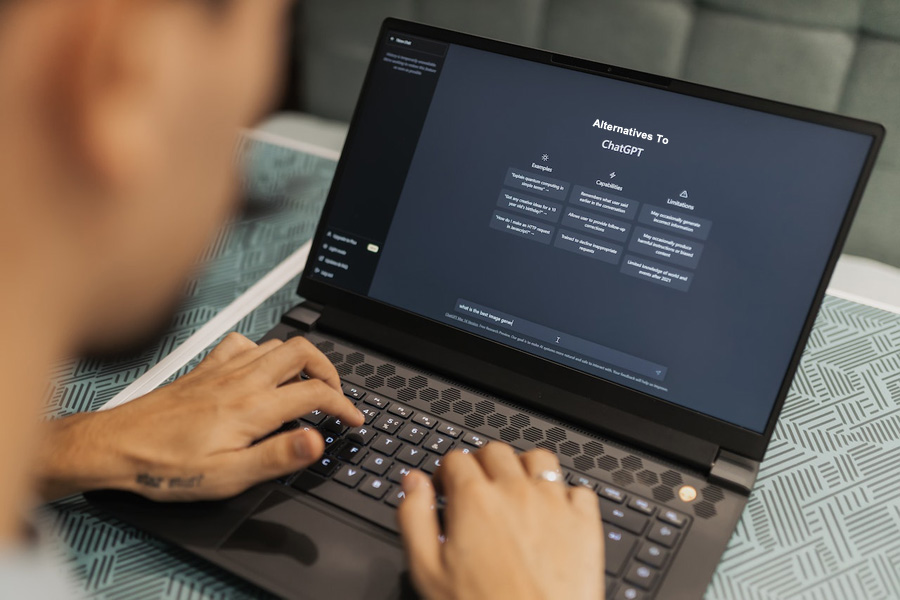
1. Google Gemini AI:
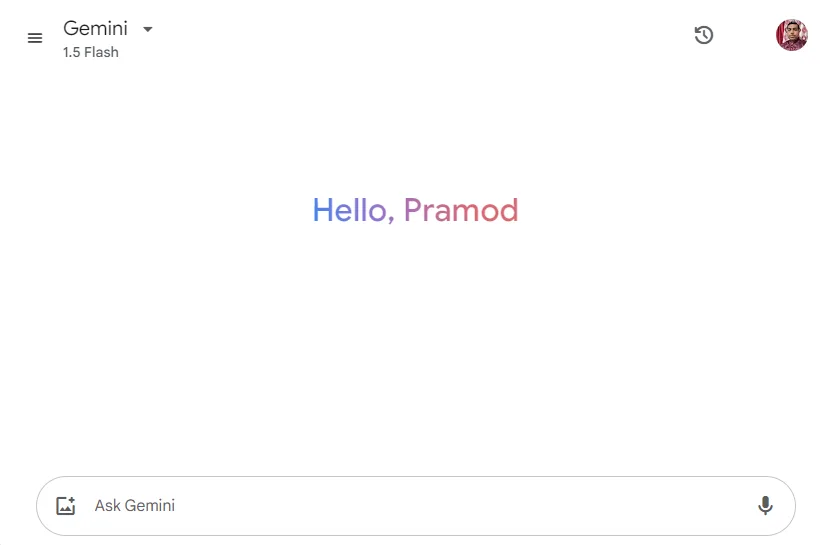
When it comes to tech, Google knows how to deliver, and its AI platform, Gemini, is no exception. Gemini combines the power of Google’s vast ecosystem—Gmail, Google Photos, YouTube, and more—with AI capabilities that rival and sometimes surpass ChatGPT.
For example, Gemini doesn’t just handle text-based queries; it supports images, real-time data, and advanced reasoning. Unlike ChatGPT’s free version, Gemini even allows image uploads and generation, making it a dream for creatives. Its integration with Google’s services also means seamless productivity. Imagine brainstorming ideas with an AI that can pull data from your Gmail or refine a concept using insights from YouTube videos. It’s not just a chatbot; it’s a multitasking genius.
Why It’s Popular:
- Seamless integration with Google services like Gmail and YouTube.
- Supports image uploads and generation, even in the free tier.
- Excels at creative tasks and real-time reasoning.
That said, while Gemini’s free tier outperforms ChatGPT in certain areas, its advanced plan doesn’t quite match ChatGPT Plus when it comes to tackling highly complex tasks. Still, for most people, Gemini strikes the perfect balance between power and usability.
2. Microsoft Copilot:
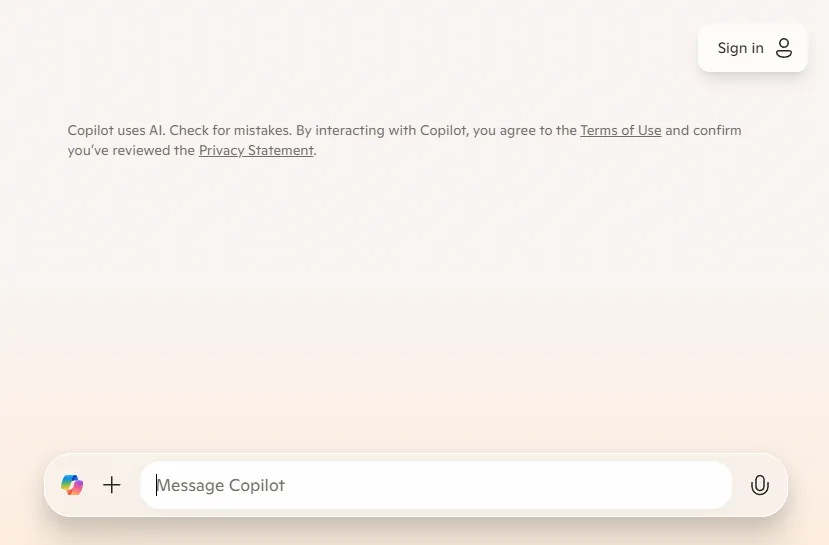
If you live in the Microsoft ecosystem, Copilot might feel like the AI assistant you’ve always needed. Pre-installed on Windows 11 and deeply integrated with Microsoft 365 apps, Copilot is more than just a chatbot—it’s a central hub for getting work done efficiently.
Imagine an AI that not only answers your questions but also updates your Excel sheets, automates tasks in Outlook, and helps you craft presentations in PowerPoint. That’s what Copilot brings to the table. It even offers multimodal capabilities, letting you interact with text, images, and documents seamlessly.
Why It’s Popular:
- Comes pre-installed on Windows 11, making it easily accessible.
- Multimodal capabilities for text, images, and document management.
- Enterprise-grade security ensures data privacy for business users.
One of Copilot’s standout features is its enterprise-grade security, which ensures that your data stays private. Whether you’re an individual user or part of a large organization, it’s a reliable choice for enhancing productivity.
3. Perplexity AI:
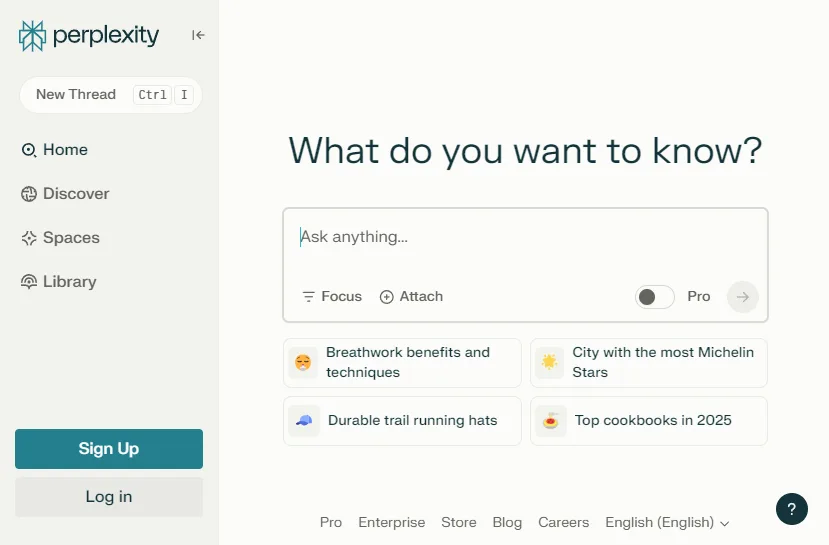
If you’ve ever been frustrated by ChatGPT’s outdated knowledge base, Perplexity AI might be your perfect match. This platform shines in real-time data retrieval, pulling information directly from the internet to give you the most accurate, up-to-date answers possible. For students, researchers, and anyone who relies on fresh insights, this is a game-changer.
Perplexity AI goes beyond simple answers, offering multimodal capabilities like document analysis and even source citations. The built-in “Discover” tab lets you stay on top of trending news, while its conversation library feature helps you save important chats for later. Whether you’re writing a research paper or just trying to keep up with current events, this tool feels like a personal assistant for your brain.
Why It’s Popular:
- Real-time internet access for up-to-date information.
- Offers multimodal capabilities, including document analysis and source citations.
- Features like the “Discover” tab for trending news and a conversation library for saved chats.
If staying updated with the latest information is your priority, Perplexity AI is the go-to tool. Unlike ChatGPT, it pulls real-time data from the internet, ensuring your answers are always current.
4. Chatsonic:
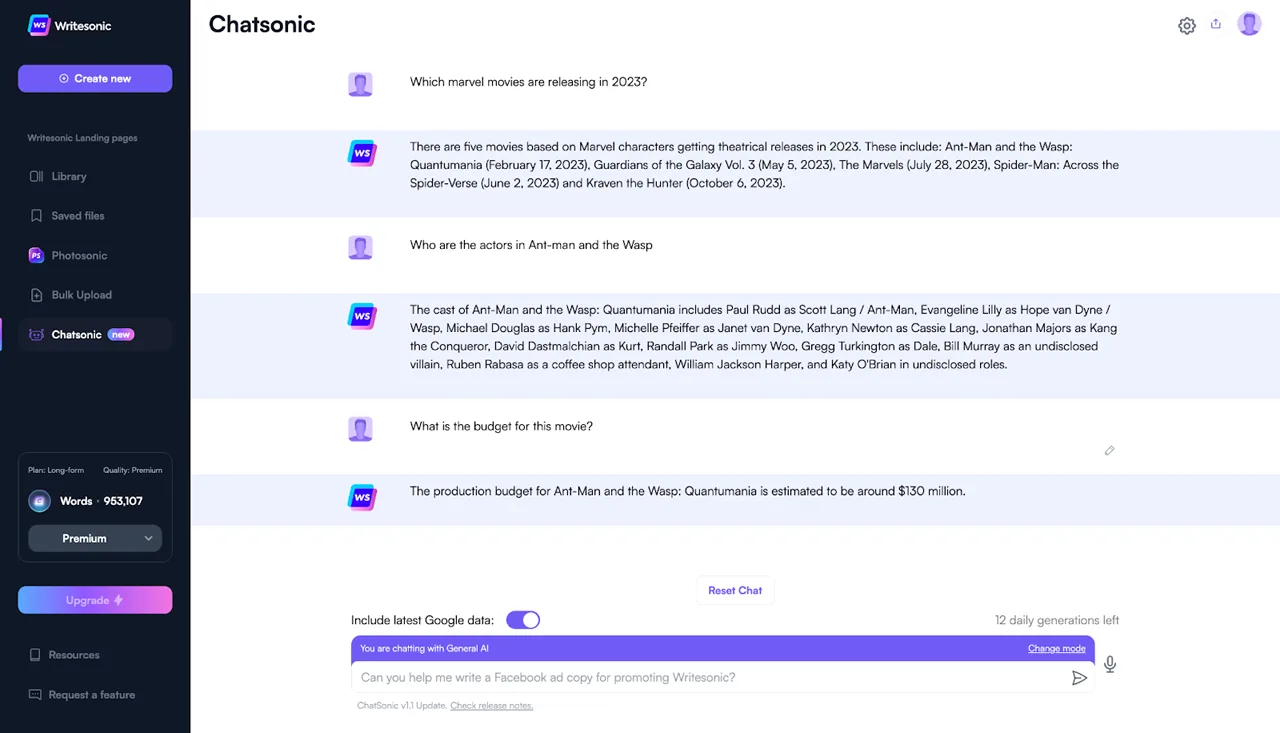
Image Credit: WriteSonic
Chatsonic might not have the fame of ChatGPT, but it’s rapidly gaining traction. With multimodal capabilities, including text-to-image functionality, it’s a tool that adapts to a wide range of tasks. Trusted by companies like Spotify and Vodafone, Chatsonic proves that newer players can compete with the big names.
Why It’s Popular:
- Multimodal support for text, voice, and images.
- Text-to-image functionality included in both free and premium tiers.
- Rapidly growing user base with strong customer endorsements.
If you’re looking for an adaptable AI that balances performance with affordability, Chatsonic deserves a spot in your toolkit.
5. GitHub Copilot:
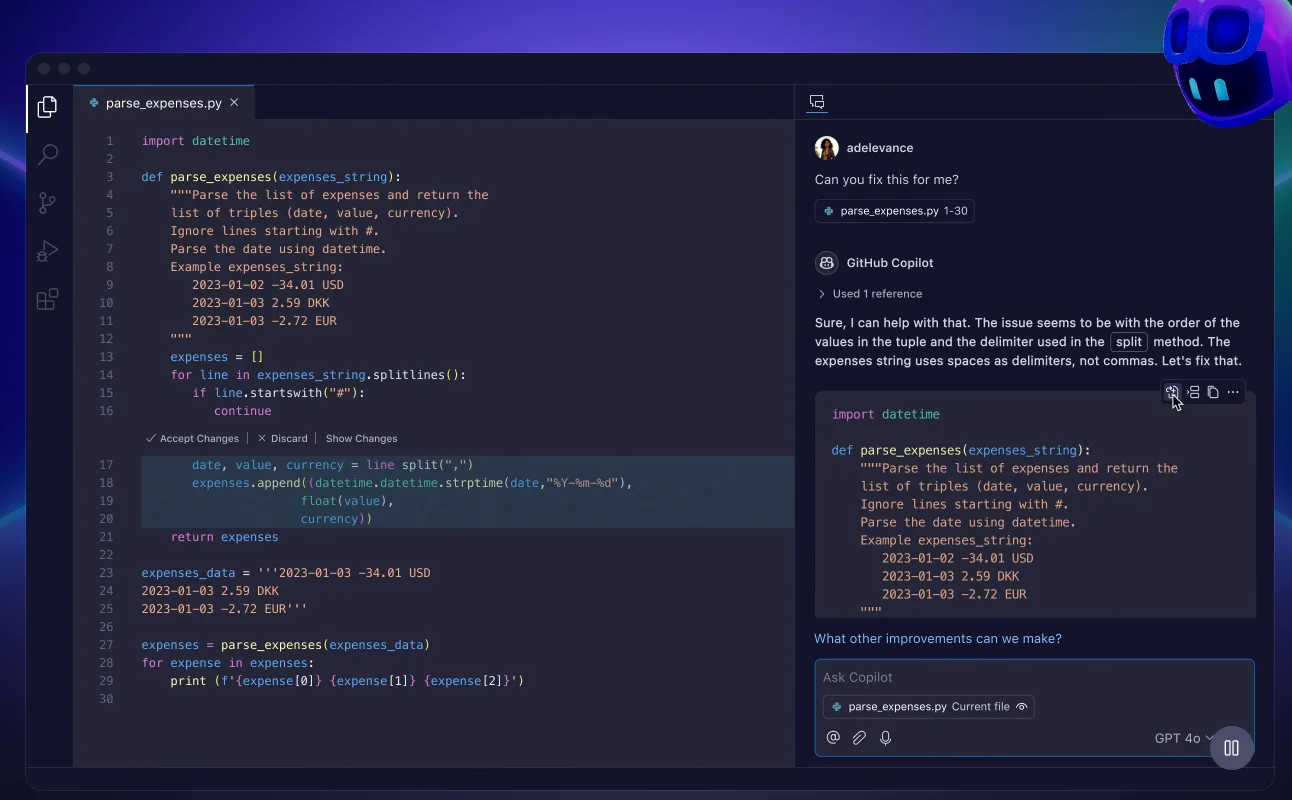
GitHub Copilot is like having a senior developer sitting next to you, ready to help with coding problems at a moment’s notice. Built specifically for programmers, it draws on a massive repository of publicly available code to suggest snippets, functions, or even entire algorithms.
This tool isn’t just for experts—it’s also a fantastic learning resource for developers exploring new programming languages or frameworks. By integrating with popular IDEs like Visual Studio Code, GitHub Copilot ensures a seamless coding experience. But beware: beginners might find themselves leaning too heavily on the AI, potentially missing out on learning opportunities.
Why It’s Popular:
- Ideal for speeding up coding and debugging.
- Trained on a vast database of open-source code repositories.
- Supports professional and enterprise use with tiered subscriptions.
When it comes to coding, GitHub Copilot is an unbeatable AI tool. Designed specifically for developers, it automates repetitive tasks, suggests code snippets, and integrates seamlessly with popular IDEs like Visual Studio Code.
6. Claude AI:
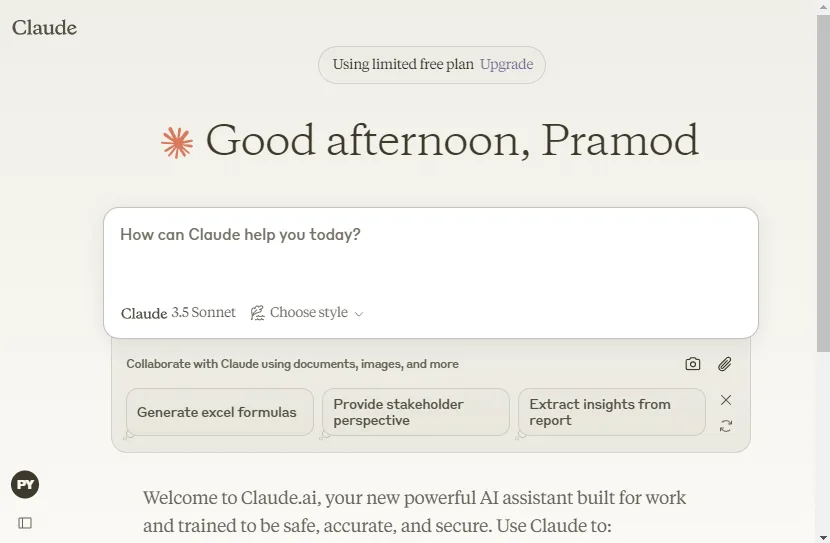
Developed in collaboration with Google and Amazon, Claude AI is a favorite among coders and anyone working on logic-heavy tasks. Claude excels at reasoning, programming, and document summarization. Its unique strength lies in its ability to process long inputs—up to 200,000 tokens—making it ideal for handling large datasets or complex requests.
One thing that sets Claude apart is its focus on ethical AI and data safety. In an age where privacy concerns run high, it’s refreshing to see a platform prioritize user trust. However, if your tasks require internet access or image generation, you might find Claude lacking. Still, for logic and programming tasks, it’s a powerhouse.
Why It’s Popular:
- Processes up to 200,000 tokens, ideal for analyzing long documents.
- Ethical AI design prioritizes data security.
- Excels at programming and reasoning tasks.
While it lacks internet access and image generation, Claude’s precision in coding and summarization tasks makes it stand out.
7. Meta AI:
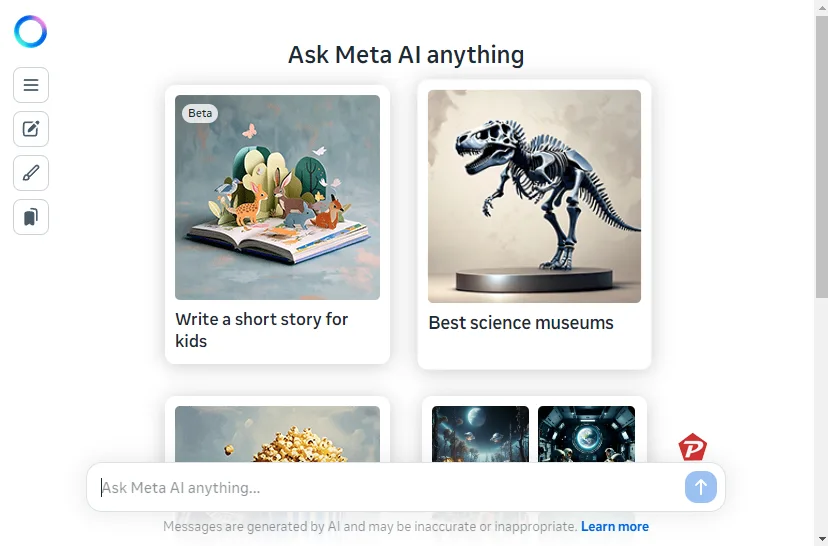
Meta AI, powered by the Llama 3.1 model, is an open-source platform that thrives on transparency and adaptability. This AI isn’t just another chatbot—it’s a tool for creatives, researchers, and developers who want something they can tweak and mold to their liking.
What makes Meta AI special is its accessibility through platforms like Instagram, WhatsApp, and Facebook. You don’t need to open a separate app or website to chat; it’s right there where you already spend your time. And with its focus on creative tasks and language processing, it’s an excellent choice for brainstorming, drafting, or just experimenting with ideas.
Why It’s Popular:
- Open-source nature allows for customization.
- Accessible on platforms like Instagram, WhatsApp, and Facebook.
- Strong in multilingual support and creative outputs.
Meta AI’s versatility makes it a favorite among tech-savvy users.
8. Gork 2 by xAI:
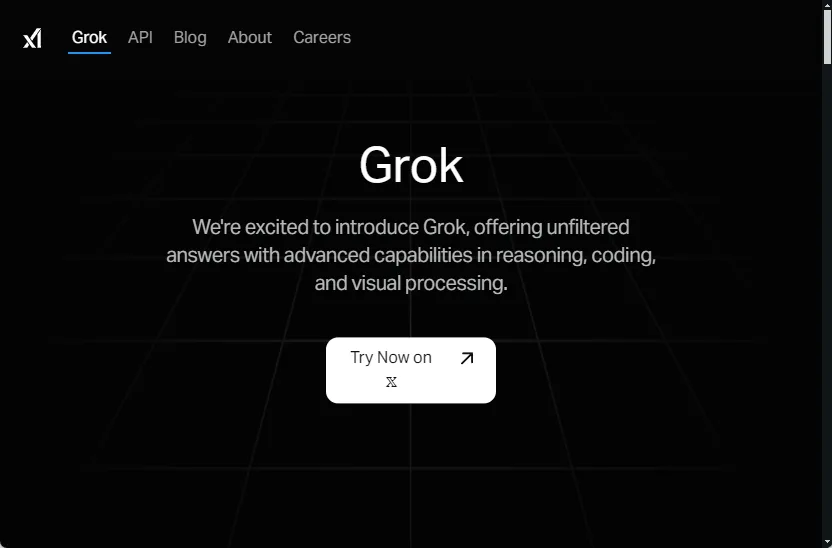
Elon Musk’s Gork 2 is still in its early stages, but it’s already making waves. Its accuracy and reasoning abilities are impressive, as shown by its near-perfect performance in recent benchmarks. While it doesn’t yet offer a free tier, its potential makes it a name to watch.
Why It’s Popular:
- Achieved a high score in reasoning benchmarks, close to ChatGPT’s performance.
- Designed to handle complex calculations and logic.
- Early adopters appreciate its potential for growth.
Gork 2 is worth exploring, especially for users focused on precision and reasoning.
9. Cohere Generate:

Cohere Generate stands out in the business world for its ability to handle long-context inputs and retrieval-augmented generation. It’s ideal for companies looking to streamline operations and content creation.
Why It’s Popular:
- Supports up to 60,000 tokens for long-form tasks.
- Tailored for enterprise applications like data retrieval and reporting.
- Highly adaptable and easy to integrate with existing workflows.
Cohere Generate is a tool that businesses can rely on for heavy-duty tasks.
10. Mistral Chat:
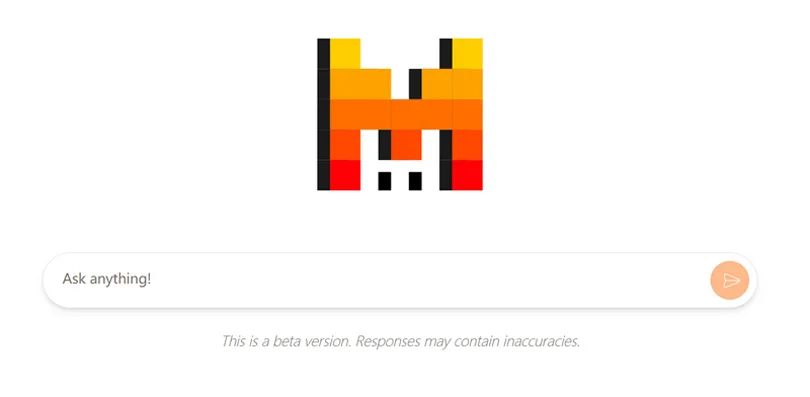
Mistral Chat rounds out our list as an affordable and effective alternative to ChatGPT. Its multilingual support and open-source design make it a hit among users on a budget.
Why It’s Popular:
- Generates human-like text with remarkable accuracy.
- Cost-effective compared to other premium AI platforms.
- Multilingual capabilities cater to a global audience.
For those who need a reliable AI without breaking the bank, Mistral Chat is a smart choice.
Final Thoughts
ChatGPT is an incredible tool, but it’s not the only player in the game. From Google Gemini’s integration capabilities to GitHub Copilot’s coding expertise, the alternatives on this list cater to a variety of needs. Whether you’re frustrated with ChatGPT’s limitations or just curious about what else is out there, exploring these options could revolutionize your workflow.
When you purchase through links on our site, we may earn an affiliate commission. Read our Affiliate Policy.



